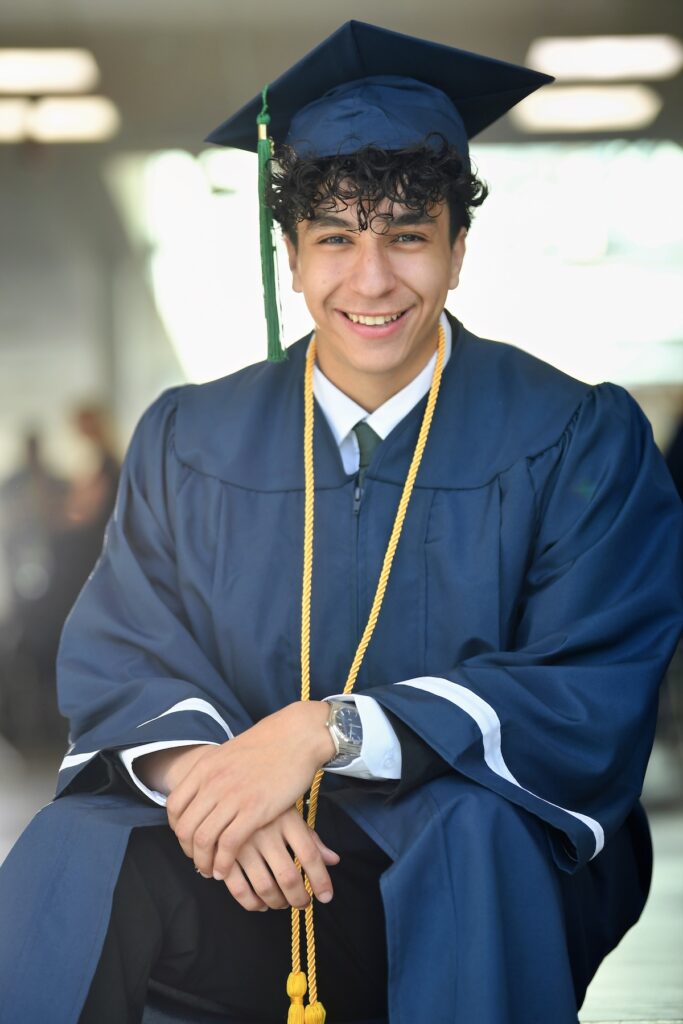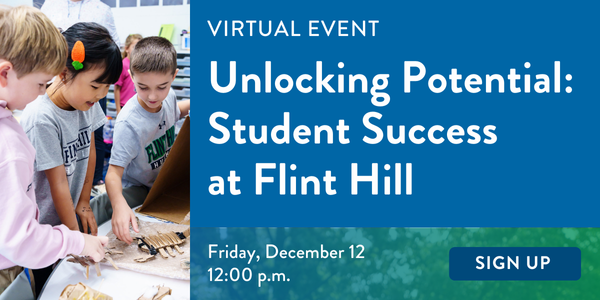Home | Admission Blogs | College Prep |
A couple of weeks ago, I found myself in Boston, surrounded by familiar faces at our annual College Alumni Dinner — a gathering of Flint Hill graduates now studying at area universities. This year’s assembly included Huskies now at Boston College, Boston University, Northeastern, Tufts, MIT, and Harvard. The table buzzed with conversation and laughter as friends reconnected, swapping stories of college life, reminiscing about favorite teachers and coaches, and sharing how Flint Hill had shaped them long after graduation.
As the evening went on, our conversation shifted toward how college — and the world — has changed. Some of the alumni were just finding their footing in their first year, while others were preparing to graduate and take their next steps into careers, graduate school, or the unknown.
One student, Malek Aloulou, a junior at Boston College, told a story that captured the moment perfectly. I remembered that he had gone to BC to study engineering, so I asked how that was going. He smiled and said, “AI has changed everything.”
Malek went on to explain that the kind of coding he had learned — and loved — at Flint Hill was now being rapidly automated by artificial intelligence. “So, I pivoted,” he said. “I switched to applied mathematics and statistics. I’m less focused on writing the code now, and more interested in understanding how to design systems that ensure the right inputs lead to the right outcomes.”

Malek Aloulou '24
In that simple comment was something profound: a shift from doing to understanding, from memorizing to innovating. Malek wasn’t abandoning his earlier learning — he was building upon it. His Flint Hill education hadn’t just given him technical skills; it had taught him how to adapt, ask questions, and see opportunity in change.
When I asked if learning to code had been time misspent, Malek didn’t hesitate. “Not at all,” he said. “At Flint Hill, I learned how to be curious and creative. I didn’t just learn facts — I learned how to think. And the relationships I had with teachers showed me how to self-advocate, ask for help, and find new ways to solve hard problems.”
Heads nodded around the table. Each student had a story echoing the same theme. They spoke of being well-prepared academically, yes — but more importantly, ready for life. They talked about knowing how to connect with professors, manage time and priorities, and navigate the less structured, more complex world of college with confidence.
One alum put it this way: “Because of Flint Hill, I know how to make my 200-student economics class feel small. I go to office hours because I learned how to do that at Flint Hill. Those relationships open doors — to research, internships, and real opportunities.”
That conversation has stayed with me. It illustrated what we strive for every day at Flint Hill: helping students become self-directed learners, problem solvers, and ethical leaders who approach challenges with confidence and humility. These qualities — curiosity, resilience, and empathy — are the foundation of true academic excellence. They are what prepare our students not just to succeed in college or work, but to thrive in a rapidly evolving world.
Our world is changing faster than any generation before. Artificial intelligence, automation, global interdependence, and climate change are reshaping the landscape of every profession. The careers our youngest Huskies will someday pursue may not even exist yet. But what will always matter — and what we focus on every day — are the human skills that endure: creativity, critical thinking, collaboration, adaptability, and integrity.
At Flint Hill, we are deliberate in how we teach and what we teach. Our faculty design learning experiences that are hands-on, inquiry-based, and rooted in relationships. Our grading and assessment systems emphasize growth and mastery, not just performance. Our co-curricular programs — from athletics to the arts to innovation labs — are extensions of the same mission: to help each child discover who they are, and how they can contribute to the world they will inherit.
Hearing from alumni like Malek affirms that mission. His story, and the stories shared by so many others that evening, remind us that education is not about preparing students for our world — but for theirs. And in that pursuit, we remain steadfast: to nurture the curiosity, confidence, and compassion that will empower every Husky to imagine what’s possible — and make it real.
Patrick McHonett is the Head of School at Flint Hill.
Posted in:



